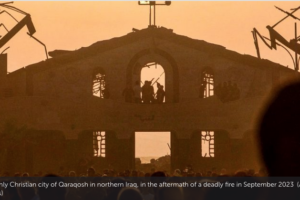VN—Aug 6, 2024—Ten years after so-called Islamic State massacred Christians and Yazidis, the Patriarch of Baghdad tells Vatican News that suffering unites all Iraqis: “We are all responsible for each other, and when we die, God will not ask if I am a Christian or a Muslim, but ‘What have you done for your brother?'”
Aug 6, 2014: 120,000 Iraqi Christians forced to flee their homes at night
Ten years ago, on the night of August 6, 2014, 120,000 Iraqi Christians were forced to flee their homes. 
Moreover, an entire people — the Yazidis — suffered an attempted extermination. Over 3,000 men, women, boys, and girls were killed, and at least 6,800 people, especially women, boys, and girls, were abducted by so-called Islamic State. This assault has been recognized by the United Nations as genocide.
It was a “collective tragedy” for the Iraqi people, Cardinal Louis Raphaël Sako, the Chaldean Patriarch of Baghdad, told Vatican News. “A tragedy involving Christians and other minorities that remains etched in people’s minds. It is true that ISIS has been defeated, but its ideology remains strong, and not only in Iraq.”
Q: What remains today of the tragedy experienced by Iraqi Christians and other minorities ten years ago?
Patriarch Sako: People do not have much faith in the future. Everyone keeps asking themselves: When will we finally have a modern, democratic, and civil state where everyone can be citizens with equal rights and duties?
This is why many leave Iraq, not just Christians. I try to talk to people, reassuring them that this evil will not last and that they need to be patient.
Q: What does the absence of Christians in the Nineveh Plain mean for Iraq?
Christians continue to fear for their safety because the country is not stable, and they are a small minority. In addition, everyone is concerned about the tensions arising from the Middle Eastern crisis.
Q: Is the whole population suffering from this anxiety?
Both the Christians of the Nineveh Plain and the Yazidis are afraid. We need to change the mentality that underlies wars and revenge.
We need to learn how to dialogue and solve problems not with weapons but through dialogue—a serious and courageous dialogue. We need to change educational programs, language, the speeches that people make.
Q: Is the West also responsible for the situation you describe?
The West is somewhat timid towards those who think the only solution is war. As Pope Francis says: war is never a victory.  Everyone loses!
Everyone loses!
The problem with the West is indifference. Everyone is focused on the logic of profit and lacks moral and spiritual values. We can also see this with what is happening in Ukraine. It is sad!
Q: What does the experience of the Christian community today, together with the genocide of the Yazidis at the hands of the so-called Islamic State, teach us?
This memory will never be easy to erase. There continue to be many acts of hatred, such as the attack last year in Qaraqosh, which caused over 133 deaths during a wedding celebration.
And the Yazidi genocide… how can one imagine, in the 21st century, that women are sold and separated from their families just because of another ethnicity? What values are there?
It is a terrible thing, not only for us, but for the entire world, which cannot prevent such things from happening.
Q: Do you have an appeal to world to open its eyes to the situation in Iraq?
I think we must not forget our brothers and sisters in humanity. We are brothers, and life is a wonderful thing.
We cannot let people die without doing anything, whether it happens in Iraq or elsewhere. Each of us is responsible for others, and when we die, God will not ask if I am a Christian or a Muslim, but will ask us: what have you done for your brother?





You must be logged in to post a comment.